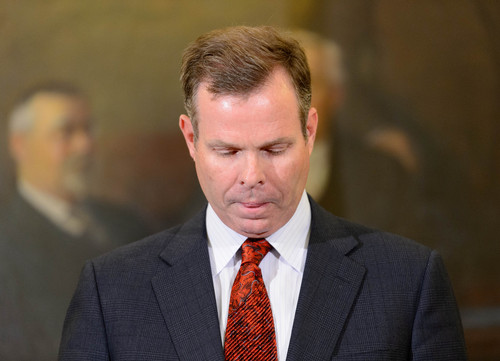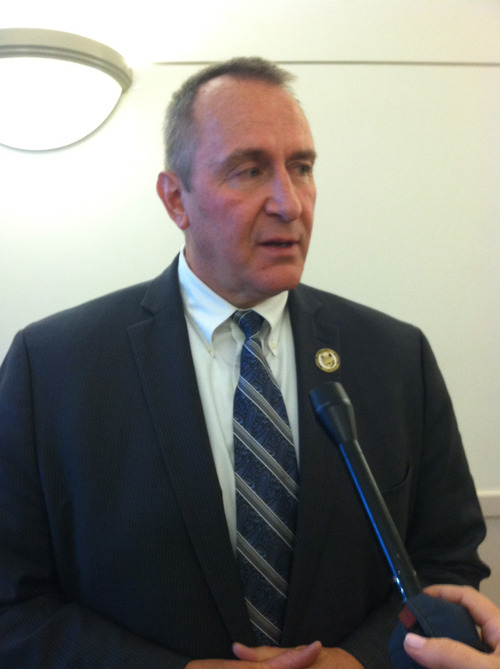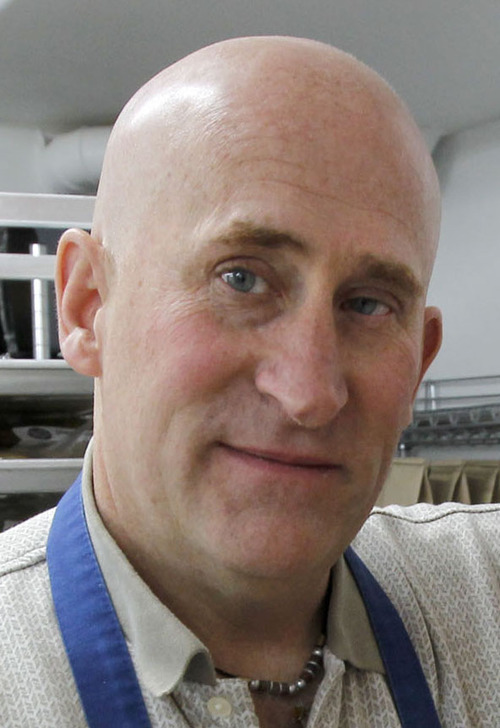This is an archived article that was published on sltrib.com in 2013, and information in the article may be outdated. It is provided only for personal research purposes and may not be reprinted.
In 2010, John Swallow, then a chief deputy attorney general, got a warning from a colleague to steer clear of Tim Lawson, a friend and "fixer" for then-Attorney General Mark Shurtleff.
"Lawson is the guy that is going to bring down the house of cards," Swallow's co-deputy, Kirk Torgensen, warned in an email.
That prognosis may prove prophetic.
On Thursday, prosecutors slapped Lawson with six felony counts, the first charges stemming from a months-long investigation into alleged misconduct by Swallow, Shurtleff and others.
The charges, filed in 3rd District Court by Salt Lake County District Attorney Sim Gill and Davis County Attorney Troy Rawlings, accuse Lawson of evading taxes, retaliating against witnesses, obstructing justice and a pattern of unlawful activity.
The FBI and the Utah Department of Public Safety arrested Lawson on Thursday afternoon and booked him into the Utah County Jail. Investigators also executed a search warrant at Lawson's Provo home.
Two charges — the pattern of unlawful activity and one tax violation count — carry potential prison terms of 15 years. The other four have sentences of up to five years each. Lawson's initial bail was set at $250,000.
Court documents allege Lawson attempted to intimidate victims of Marc Sessions Jenson, a businessman who is charged with defrauding investors as part of the $3.5 billion Mount Holly ski and golf resort planned near Beaver.
Lawson is also charged with threatening Utah businessman Darl McBride, who has said that Lawson threatened to have him beaten up if he didn't take down a website critical of Mark Robbins. McBride said Robbins, a Jenson business associate, owed him money.
Shurtleff later met with McBride and offered to get him $2 million — money he said he would get from Jenson — if McBride would take down the site.
Close ties • The charging documents paint a portrait of cozy connections between Lawson and both Shurtleff and Swallow, who resigned as attorney general effective Dec. 3.
All three visited Jenson's Southern California villa together in 2009. Swallow and Lawson exchanged more than 680 text messages and phone calls between April 2009 and March 2013. More calls and texts continued until at least September.
Their conversations ranged from holiday plans to Swallow's 2012 election to the ongoing FBI investigation into Swallow and the possibility that Lawson's phone had been tapped.
The charges stem from months of work by Gill, Rawlings and investigators from the FBI and the Utah Department of Public Safety.
"This is a charge we have filed against Mr. Lawson. That is all it pertains to," Gill said. "We are in the middle of the investigation. We continue to work through that investigation. We still have a lot of materials to continue to work through. … This is still open and active and we are not close to finishing it up yet."
Even so, Rawlings acknowledged that the count alleging a pattern of unlawful activity — the state equivalent of racketeering — points to the involvement of other parties but would not specify whom they might be.
"The very nature of the [racketeering] charge means Mr. Lawson wasn't acting alone or in a vacuum," Rawlings said. "However, nobody else has been charged to date and all inferences beyond that point would be unfair to comment on."
Shurtleff declined to comment Thursday. Swallow's attorney, Rod Snow, said he doesn't see anything in the charges that implicates his client in anything illegal and challenged some of the allegations in the documents.
Snow said he doesn't believe 680 calls or texts took place between Lawson and Swallow. Nor does he believe Swallow participated in a meeting during which, according to the charges, Shurtleff asked Jenson to pay $2 million to McBride. Swallow's trips to Jenson's Pelican Hill villa in Newport Beach, Snow noted, all occurred before his client worked in the attorney general's office.
"John was concerned about Lawson," Snow said, "and went out of his way to keep his distance from him when he was running for attorney general."
Eric Benson, a former federal prosecutor who is now a defense attorney, said he was struck by the specificity of the allegations in the charging documents.
"They go into golf outings and specific meetings and they're naming names of two former attorneys general. So it's pretty unique. … The length, the breadth, are pretty unique and it could be a harbinger of things to come," Benson said. "This thing reads like a movie. … It shows me they put a lot of time into this investigation or, at the very least, they've got a lot of people working on it very carefully."
Campaign moneymaker • Lawson was a prolific campaign fundrasier for Shurtleff. Several emails from 2007 and 2008 show the two men discussing fundraisers and meetings in which Shurtleff would be receiving large donations, in some instances $15,000 or more.
Lawson connected Shurtleff to Pre-Paid Legal Services, Mentoring of America and others in the so-called "biz-ops" industry, which became Shurtleff's largest donors, pumping tens of thousands of dollars into his campaign accounts.
Emails also appear to show that Lawson introduced Shurtleff to Jeremy Johnson, the St. George businessman who founded I Works and now faces an 86-count criminal indictment and a federal lawsuit over various fraud allegations. Johnson and his associates gave more than $200,000 to Shurtleff's campaigns through the years.
Jenson has said he was introduced to Lawson by a Shurtleff fundraiser, Rob Stahura. Lawson told Jenson he was friends with Shurtleff and agreed to work behind the scenes with the attorney general's office to get Jenson a more lenient plea deal, Jenson said.
In February 2008, records show, Lawson sent Shurtleff an email about Jenson's plea deal.
"All I would like you to do, bro, is review this," Lawson wrote to Shurtleff, who forwarded it to Torgensen and Scott Reed, head of the criminal division.
"Why are we dealing with this guy [Lawson]?" Torgensen replied. "We cannot ethically deal with this guy outside of Jenson's counsel. This is inappropriate for Lawson to be doing this."
Shurtleff continued to keep close tabs on the Jenson case and in May 2008 — after a judge tossed an initial plea deal as too lenient — agreed to a plea in abeyance and restitution in the case.
From January to November 2009, Jenson — whom prosecutors granted immunity — paid Lawson $120,000, the charging documents state, to "gain access to then-Utah Attorney General Mark Shurtleff and to influence, on Jenson's behalf, potential witnesses and/or victims in Jenson's criminal cases and/or anticipated civil litigation."
Lawson did not pay taxes on the income, according to the charges.
During the same time frame, Lawson, Shurtleff and Swallow all visited Jenson's Pelican Hill villa and stayed on Jenson's dime.
Investors who said they were scammed by Jenson received hostile text messages and emails from Lawson when they were trying to recoup their money, according to records previously released under an open-records request.
In one email, Lawson invoked his friendship with Shurtleff to try to get Colorado physician Jeffrey Donner to back off his efforts to recoup his investment from Jenson. When that failed, he unleashed a tirade.
"I believe that your insecurities, penis envy or the fact that you are [a] sad and lonely shell of a man will stop you from doing the right things to correct this," Lawson wrote. "It is your money, your life and ultimately your very lonely death in the end that will be a testament to how you lived."
Lawson also threatened to reveal supposed illegal activities at Donner's practice, the charging documents allege.
McBride told The Salt Lake Tribune earlier this year that he had received threatening messages from Lawson when McBride was trying to collect a debt from Robbins, who was at the center of a controversial land deal for a Utah Transit Authority FrontRunner station in Draper.
McBride said Lawson threatened to have him beaten up, told him he had guns and called himself "Mark Shurtleff's Orrin Porter Rockwell," referring to the enforcer for early Mormon leaders Joseph Smith and Brigham Young.
The charges state that Lawson also threatened to have McBride jailed, claiming Shurtleff knew "things" about McBride.
During a May 2009 meeting at Mimi's Cafe, which McBride secretly recorded, Shurtleff offered to get McBride $2 million from Jenson. Shurtleff said he thought he could do that because Jenson was still subject to the plea deal with the attorney general's office.
The charging documents state that, during a trip to Pelican Hill, Jenson said Shurtleff asked him to pay McBride $2 million, even though Jenson still owed $4.1 million in restitution.
Lawson brought other cases to the attorney general's office on behalf of friends, in one instance urging prosecutors to press charges against a prospective business partner's ex-wife.
His entanglements with the office became so disconcerting to Shurtleff's top deputies that — without notifying Shurtleff — in early 2012 they asked an investigator with the state Department of Public Safety to examine whether Lawson was breaking the law.
This past February, top officials in the office huddled with Rawlings to discuss the case. The Davis County prosecutor raised questions of whether Shurtleff might be complicit, rather than a witness, in potential crimes.
The investigation proceeded and, in May, Lawson said he was visited by DPS Investigator Scott Nesbitt and FBI Agent Jon Isakson.
Torgensen said Thursday he repeatedly warned Shurtleff and Swallow about Lawson's conduct and advised them to keep their distance.
"I said, 'I don't know why this guy is out there saying, I can represent you with the attorney general. It's inappropriate and it's got to stop,' " Torgensen said. When Donner's attorney contacted the office to report Lawson's intimidating correspondence, Torgensen said he had a frank, closed-door meeting with Shurtleff.
Torgensen said he gave similar advice to Swallow soon after he joined the office in late 2009: "I was simply saying, 'If I were you, I'd stay away from this guy.' "
Twitter: @RobertGehrke
Tom Harvey contributed to this story







